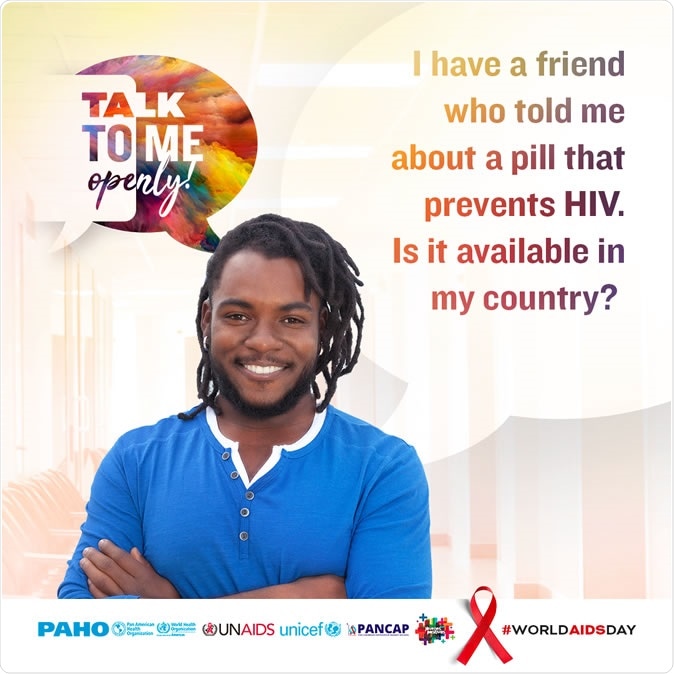Repeating the message of so many years, World AIDS Day has come and gone. This year, the focus was on improving communication between the “victims” and the healthcare providers so that the former can get the care they need without having to come to terms with their lifestyle choices.
World AIDS Day is on December 1 and is aimed at helping those who are battling HIV infection in the world as well as helping others understand that this is a worldwide problem. This year, the Goliath they face is discrimination by healthcare providers.

The purpose of the campaign
The Pan American Health Organization (PAHO) along with the UNAIDS, UNICEF, the Latin American Network of Young People Living with HIV (J+LAC), and the Pan Caribbean Partnership against HIV and AIDS (PANCAP) have launched their campaign for World AIDS Day, 2019 – Talk to me openly. The people behind this slogan aim to promote free communication about HIV between healthcare workers and young people, avoiding discrimination. The idea is that this will help provide greater access to care and prevention services.
In addition, they want healthcare workers to become more “sensitized” so that they speak with men who have a very high-risk lifestyle, including men who have sex with men (MSM), in such a way that the latter feel they can get the information and support they want as they live their sexual lives out in the way they think they deserve to. Another objective is to provide groups such as MSM, which accounts for most cases of new HIV infection in developed regions of the world, with non-stigmatizing and non-discriminatory health care.
HIV in the Caribbean: Talk to me openly
Marcos Espinal, who heads the Department of Communicable Diseases and Environmental Determinants of Health at PAHO, says, “We want health professionals to listen to young people and to have open, respectful conversations about HIV and sexually transmitted infections as part of the sexual and reproductive health services they offer.” In his opinion, this means they are “more likely to access and stay in touch with health services for testing or to seek measures that can prevent them from contracting or transmitting HIV.”
The reality
New HIV infections are on the rise in many places – 7% increase in Latin America, with 100,000 new infections in a single year (2018). About 20% of these are aged 15-24 years; in the Caribbean, this rises to over 25%. 40% of new infections in Latin America and 22% in the Caribbean occur in MSM, which is at a 22 times higher risk of acquiring this infection, undoubtedly due to their sexual preferences. In the US, about 70% of such infections occur in MSM according to the 2017 statistics released by the Centers for Disease Control and Prevention (CDC). About 65% of these were below the age of 35.
The campaign was crafted by young people with and without HIV infection, from Latin America. They have created a variety of presentation media – posters, cards, social media cards, animations and videos. The focus is on impressing the need for an open mind on those who communicate with these people, so that they do so at a human level, with respect for “diversity”.
PAHO and other organizations say they are committed to ending HIV infections by the year 2030. In fact, there has been a 16% reduction in new infections in the Caribbean. In 2018, the number of new cases in this region was 16,000.
However, the rising rate of infection in Latin America, the fact that up to 27% of new infections in the Caribbean are in young people below 24 years of age, and the disproportionately high incidence among MSM worldwide, may just point to the fact that new tools and technology just might not be enough to battle this plague.
A better solution?
It may be essential at this point to note that the CDC has placed sexual abstinence is placed first on its website, as the only totally effective way to prevent HIV, and that delaying sexual intercourse could reduce the risk of HIV over a lifetime. The CDC also recommends discussing abstinence decisions with partners to prevent acquiring or transmitting HIV.
Sexual abstinence is not a cultural more of bygone medievalism but a very important and relevant tool in cutting down HIV transmission. Most studies have shown the importance of multiple inputs from parents, teachers, media, NGOs and faith-based institutions in successfully reflecting the desirability of abstinence during young adulthood, as a way to achieve HIV control. Such programs have been proved to reduce HIV risk behaviour over both the short and long term, without any harmful effects, and research has shown that this is unquestionably safe and highly effective.
In the words of Uzoigwe (The Lancet Global Health, 2017), “The evidence is unquestionable that abstinence and fidelity reduce HIV transmission. The fact that this message appears neither popular nor palatable cannot justify health-care professionals failing to praise the veracity of this message.” Perhaps this should be taken to heart by policymakers in the fight against HIV infection. Just as risk avoidance is propagated widely in the case of smoking or obesity, it should be disseminated more widely in this area.